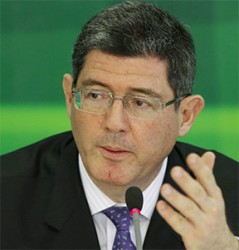BRASILIA (Reuters) – Brazil’s government must make difficult budget cuts to improve investor confidence and restore economic growth, the country’s new Finance Minister Joaquim Levy said yesterday.
At his swearing-in ceremony in Brasilia, former treasury chief Levy said the fiscal adjustments will require the participation of society as a whole and will involve spending cuts and possible tax hikes.

“Fiscal balance is indispensable in order to continue granting opportunities to our people,” Levy said. He said that Brazil would see benefits such as greater business confidence, better-developed credit markets, higher levels of entrepreneurship and greater foreign investment.
Levy named his policy-making team at the same event, tapping former finance ministry official Marcelo Barbosa Saintive to replace Arno Augustin as Treasury Secretary.
Tarcisio Godoy, a Banco Bradesco executive who worked previously with Levy in government, will take the No 2 position at the finance ministry.
President Dilma Rousseff appointed Levy, a former banker, in an attempt to calm investors worried over her administration’s heavy intervention in the private sector and deteriorating economic fundamentals. Levy is a fiscal conservative known for slashing spending during his 2003-2006 stint at the treasury.
The administration has already announced cuts in subsidies to public banks, higher interest rates at state development bank BNDES and limits to pension and unemployment benefits.
Yesterday, Levy said those adjustment measures will help bolster confidence and support investments without the need of more government aid to certain sectors.
“Brazil has proven to be a resilient economy,” Levy told reporters after his swearing-in ceremony. “We need to give everyone the same clear rules to lower the anxiety of businesses.”
He said that any tax increases will aim to support the country’s savings rate, which is one of the lowest among the world’s top emerging market nations.
Levy also said the government will simplify the tax regime and “harmonize” taxes charged on investment instruments to increase private funding in a market known for the lack of long-term credit.
Still, many investors remain doubtful that Levy will have the autonomy to implement the full set of changes needed to improve the government’s accounts.
New Planning Minister Nelson Barbosa on Saturday publicly recanted his comments that the government planned to modify the minimum wage adjustment formula. Brazilian media reported that Rousseff asked Barbosa to change his stance given past promises made to union leaders.




